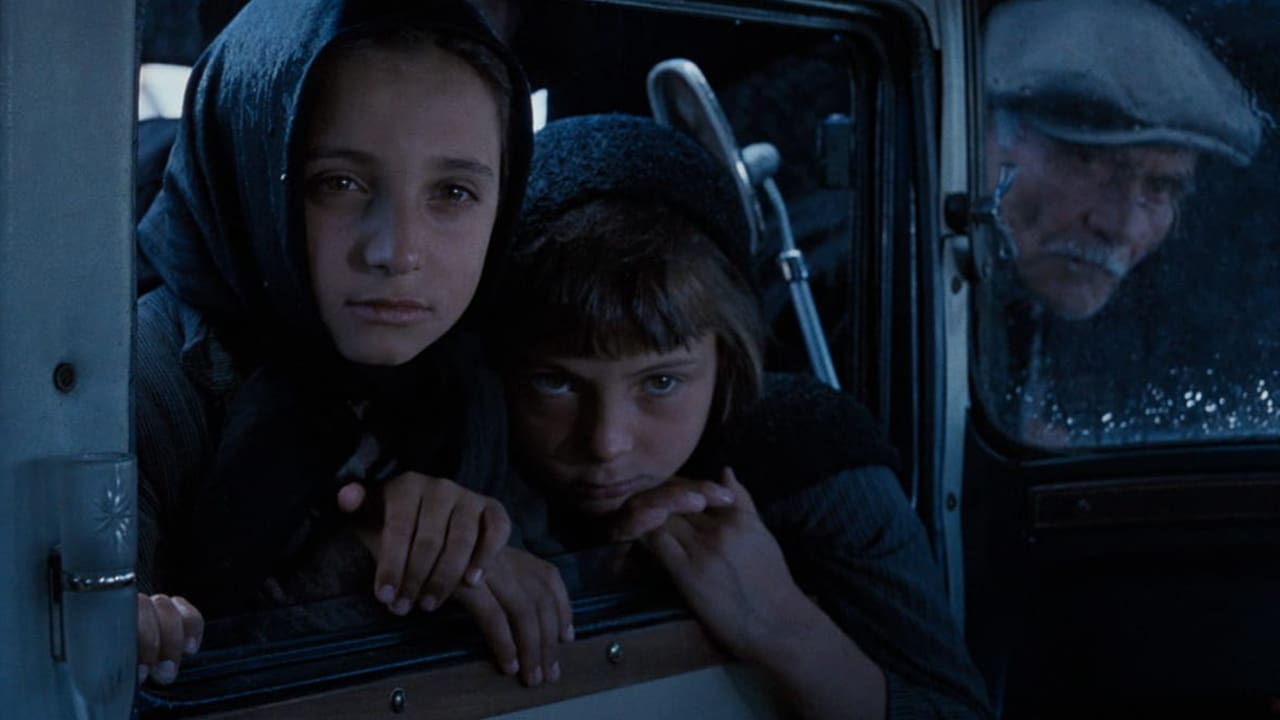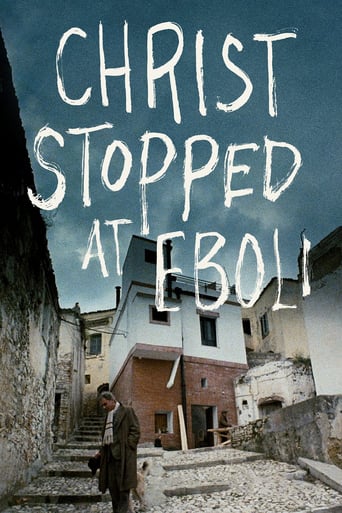Colibel
Terrible acting, screenplay and direction.
Platicsco
Good story, Not enough for a whole film
GarnettTeenage
The film was still a fun one that will make you laugh and have you leaving the theater feeling like you just stole something valuable and got away with it.
Catangro
After playing with our expectations, this turns out to be a very different sort of film.
Jackson Booth-Millard
I knew nothing about this Italian film until I found it in the book 1001 Movies You Must See Before You Die, without this recommendation I would certainly not have watched it, directed by Francesco Rosi (Three Brothers (Tre Fratelli)). Based on the real-life memoir, Carlo Levi (A Fistful of Dollars' Gian Maria Volontè) is an intellectual, painter and writer, he also has a degree in medicine. He was arrested in 1935 by Mussolini's regime for his anti-fascist activities, and following his release he is forced into exile, and went to live in a small, isolated village in a remote town in Southern Italy, in the region of Lucania, known today as Basilicata. The landscape is beautiful, but the village is populated by poor and neglected inhabitants, barely surviving on the meagre harvest of the unyielding land. Eboli, the closest train station, is the last outpost of civilisation (such as it is), according to the local tales, even Christ, in his southward journey, went no further than Eboli, beyond that point there is only abandon, neglect, desolation and human despair. With local doctors not interested in peasants, and not trusted by them, Carlo begins to help the villagers in any way can, over time, he learns to appreciate the beauty and wisdom of the peasants, and to overcome his isolation. Also starring Paolo Bonacelli as Don Luigi Magalone, Alain Cuny as Barone Nicola Rotunno, Lea Massari as Luisa Levi, Irene Papas as Giulia Venere and François Simon as Don Traiella. The performance of Volontè is subtle but fine, there is not very much that happens in this film, and it is almost two and a half hours long, but perhaps that is the point, because the landscape is full of mostly misery, it certainly has memorable imagery, a fairly interesting drama. It won the BAFTA for Best Foreign Language Film (the first foreign film in history to do so). Worth watching!
morrison-dylan-fan
1997:Checking some videos that my dad had recently brought,I spotted a double video of a wonderfully looking film.Opening the case,I was disappointed to find that the set only contained the second Video.2014:With having spent over 10 years trying to track a DVD/video version of the title,I decided to ask a DVD seller,who to my surprise revealed that he had recently gotten hold of the film! This led to me excitingly getting ready to finally pay a visit to Eboli.The plot:Italy 1935:Speaking out against the fascist regime of Italy,painter/doctor Carlo Levi is punished by the government ,by being put on a train which takes him (and dozens of other "trouble makers") to an isolated rural village on the south side of Italy,miles away from the wheels of power based in the north of the country.Arriving in the village,Levi is greeted by Mayor Don Luigi Magalone,who politely tells Levi that he must register his name every day,and that he is not allowed to take part in any "sub verse" activities.While Levi initially finds himself longing to get back home,Levi soon finds himself becoming increasingly fascinated with the poor life style that the villagers are living,which would have been completely alien to him in the big cities.View on the film:Adapting Carlo Levi's (who would end up unsuccessfully running for the Senate as an independent communist in the 1963 elections)autobiography over a 200 minute running time (good to see they kept things short & sweet!) the screenplay by writer/ (along with Tonino Guerra and Raffaele La Capria)director Francesco Rosi disappointingly never fully expresses the passage of time that the movie attempts to cover,with the progression of Levi's relationship with the villages being one which progresses in sudden bursts,rather than a more gradual,natural pace.Separating the 200 minutes as 4 TV episodes,the writers go into a superb amount of detail into the daily struggle that people in the south of Italy face,with every change in tax and the withdrawal of doctors that the government makes turning the village into a waste land which is on a completely different planet to the mighty Rome.Creating a mysterious atmosphere,Rosi and cinematographer Pasqualino De Santis brilliantly use over-saturated colours to display the almost otherworldly landscape that Levi finds himself surrounded by,which is revealed in expertly handled wide-shots.As Levi starts to become friends with the village residences,Rosi heats up the colours into warm blues & yellows which show the warmth that has built up between Levi and the towns people.Stealing every scene that he's in, Paolo Bonacelli gives a tremendous performance as fascist mayor Don Luigi Magalone,with Bonacelli giving Magalone a bumbling kick as he finds himself getting out smarted in every direction by Levi.Perfectly expressing Levi's initial uncomfortable feelings over stepping out of his comfort zone, Gian Maria Volonté gives a striking,subtle performance as Levi,with Gian Maria Volonté injecting Levi's voice with a real sense of gravitas,as he finds himself getting deeply involved with a community,from what was previously an unknown land.
Rodrigo Amaro
A reason why many people believe films and politics shouldn't been together is the fact most films dealing with social political issues have in their nucleus the use of an abundant and wasted verbosity in which nothing is said, things are half done and the movie becomes other thing than a movie. Sometimes these movies get so preachy about a case that end up sounding idiotic, looks like they selling something to its viewers. And in the end, people who already don't care about the importance of politics in their lives will never understand it how influential this power is. Now, what "Cristo Si è Fermato a Eboli" ("Christ Stopped at Eboli") achieves in its deeper premise is showing how politics have to do with the humblest people of a country and the way it affects them, mostly for the bad things since this is a film about Italy during the Fascist regime in the 1930's and 1940's. The main character Carlo Levi (Gian Maria Volonté) is an exiled painter and also a medical doctor who helps the peasants of Eboli, a small village to overcome their daily problems by assisting them with some medical treatment (since the local doctors don't care about them properly) and listening to what they have to say. He's there almost like a prisoner, he can't write letters criticizing the government, can't read Montaigne, can't go outside of the city limits but he has some liberties here and there. And despite being marveled by the simplicity of the peasants life and how things work for them this is a man aware of the politics importance and still seems to, quietly, fight the Fascism on its own way, giving some trouble to the city mayor. In one of the most fascinating moments of the film, the poor cause a great commotion in the city hall, urging that Carlo must be their doctor, something he couldn't do it at the moment since the regime wouldn't allow him.As being an observation to life rather than a dramatic picture, this Francesco Rosi's film is quite interesting when it gets to this social theme but it disappoints by going for too long and showing so less; scenes are quite distractive, long, some dialogs are uninteresting; and after seeing as a whole the movie didn't work as I expected, it was quite meaningless. I like slow-paced films but this is just too much. Volonté's performance is very good, he's very versatile, pleasant; the cast is quite good; the film is beautifully shot and the locations are wonderful but only that can't make a film better. One scene I'll hope to remember in years to come is the Christmas mass with the drunken priest who lost the paper with his nice speech, to later be found with him saying: "This is a miracle from God. I've found my speech." And what it turns out to be his speech? A denounce against the Fascist. It's a very funny memorable scene. It's not a bad film, it's just a little weak. Worths a view for curiosity, for its themes and some good elements already pointed out in this review. 5/10
jotix100
Carlo Levi, an Italian who fought against the arrival of Fascism in his native Torino, was arrested for his activities and sent to exile in the Lucania region of the country, now known as Basilicata. The hill town of Gagliano was to be his home for the time he had to serve. This was the Italy of the 1930s where the rise of Mussolini and his quest for conquering Ethiopia, an ill conceived idea from the start.We watch as Dr. Levi arrives at the Eboli station, where he must change to a local train and a taxi in order to reach the hill town, which was also the home of other political prisoners. Right after Levi descends from his train at Eboli, he sees Barone, a dog that has been abandoned and who will become his companion in exile. His arrival in Gagliano causes curiosity among the local folk, who see in him a cultured man who sticks out. Carlo Levi observes the people as he takes his daily walks. He can't help but notice how backward everyone seems to him. At the same time, he gets to appreciate them because even if they are ignorant of the outside world, they are genuine.Levi, who had training as a physician, receives a visit from his sister Luisa, a doctor herself. He comments on the primitive state of medicine in the town, a place that boasts two doctors, who are ineffective and set in their ways. Levi clashes with the mayor, a man who is a devout follower of Mussolini and his movement, because the way he wants to censor his communication with friends. After he receives his release, Levi is not prepared for the way he made his presence felt among the locals who come to see him off.Francesco Rosi, who adapted Carlo Levi's novel, is a director with a strong sense of political awareness. He presents the figure of Carlo Levi as a noble man who was helpless against what he wanted to do for the people of Gagliano, but the local government was not exactly enthusiastic about his meddling in the local affairs. Where he is able to connect with the populace is with his knowledge of medicine. Carlo Levi also painted the people of the region.Gian Maria Volonte was an actor of quiet intensity. He is in almost all the scenes and he expresses a rage with his eyes. Mr. Volonte was the main reason for watching the film. Since he had collaborated with Rosi before, it seemed logical he would portray Carlo Levi in the movies, something that he does with ease and elegance. Others in the film include Lea Massari, as Luisa, Irene Papas as Giuglia, Alain Cluny as the Barone Nicola Rotondo. A favorable impression is made by Paolo Bonacelli, who appears as the mayor Luigi Magalone, who even when censoring Levi showed a lot of respect for him.The actual filming was done in Aliano, an ancient hill town, where the real Carlo Levi went to live after the war. Pasqualino DeSantis, the cinematographer, captured in vivid images the picturesque town, the countryside and the people of this lost city. Francesco Rosi made an interesting film about a man of principle that will live forever.

